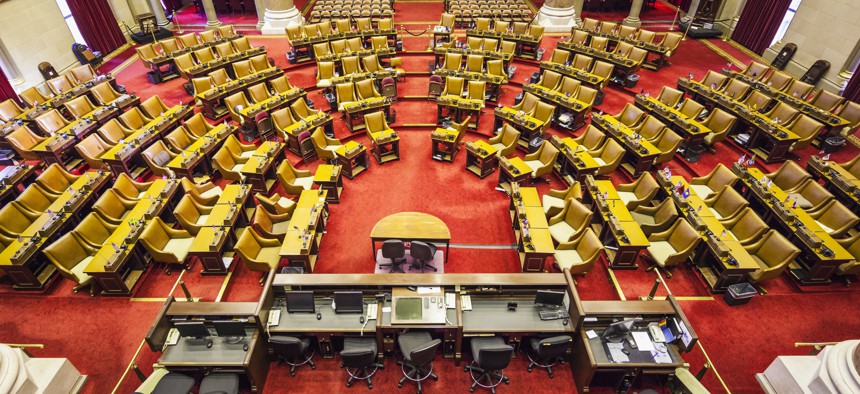The bills nonprofits are advocating for this upcoming legislative session
From the Elder Parole and Fair & Timely Parole bills to medication abortion access on CUNY and SUNY campuses, nonprofits are working this legislative session to get these bills passed.

Walter Bibikow
The 2023 legislative session has arrived alongside advocacy from nonprofit organizations across New York pushing for various pieces of legislation to be passed. From addressing abortion access to criminal justice, here are the pieces of legislation organizations are pushing for this 2023 legislative session.
Senate Bill S9444A/Assembly Bill A3322A - Medication abortion access on CUNY/SUNY campuses
The pair of bills require both CUNY and SUNY campuses to offer medication abortion on-campus while also creating a fund to implement these services. The bills are sponsored by state Sen. Cordell Cleare and Assembly Member Harvey Epstein and is currently in committee.
With SUNY students needing to travel dozens of miles before being able to access reproductive healthcare, activists are calling on electeds to pass this bill so students are able to overcome this barrier. Since the fall of Roe v. Wade, abortion clinics have been overwhelmed with out-of-towners seeking abortions. Students said they believe that offering medication abortion on campuses will mean easing the need for abortion clinics, while dodging protestors waiting outside the facilities. Organizations such as Planned Parenthood, Advocates for Youth, the Reproductive Justice Collective, the Reproductive Justice Initiative (a part of Columbia School of Social Work), the United University Professions and the Professional Staff Congress at CUNY are working together to ensure this bill gets passed this legislative session.
Senate Bill S1553D/Assembly Bill A6399C - The Clean Slate Act
The Clean Slate Act would seal a person’s criminal records after a set period of time. The bill is sponsored by state Sen. Zellnor Myrie and has been passed in the Senate, but not the Assembly as of yet. Organizations such as Center for Community Alternatives have been leading the charge to advocate for this bill.
Sealing records is usually inaccessible as it requires costly fees, while some people don’t even know sealing is an option. The Clean Slate Act would make sealing more accessible by making record sealing automatic, misdemeanors would be sealed after 3 years and felonies after 7 years (as long as there is no subsequent charge pending and the person is not on parole or probation). Sex offenses are not eligible for record sealing.
Advocates argue that previously incarcerated people have paid their debt to society and should no longer suffer the consequences from their previous conviction. Those who have left incarceration behind still suffer from barriers in accessing education, housing and jobs. Sealing records is the solution, advocates argue, as it guards previously incarcerated people from discrimination and expands their eligibility for benefits.
Senate Bill S7871/Assembly Bill A9166 - Eliminate Mandatory Minimums Act
The Elminate Mandatory Minimums Act will remove the mandatory minimum sentencing, which includes the three strike rule. The three strike rule says that any person who has committed 3 violent or drug related felonies must be sentenced to life without parole. The legislation is sponsored by Senator Zellnor Myrie and Assemblymember Demond Meeks.
Advocates believe that this legislation will undo the harms that were brought on during the Rockefellar Drug Law Era. This law would require a hearing before incarceration and give judges more authority over sentencing versus giving prosecutors the power in the case. The bill is currently in committee. The Communities Not Cages coalition has been fiercely advocating for this bill.
Senate Bill S7872/Assembly Bill A8894 - Second Look Act
The Second Look Act will allow incarcerated persons to apply for a sentence reduction. It is sponsored by state Sen. Jualia Salaazar and currently in committee. The Communities Not Cages coalition has been advocating for the passage of this bill.
Almost 9,000 New Yorkers are serving life sentences, with New York having the third-largest population in the nation serving life sentences. Those who are for the passage of the Second Look Act believe that in order to reduce unnecessary incarceration, reviewing an individual’s growth and rehabilitation after a certain amount of years will relieve the incarcerated population.
Senate Bill S7873A/Assembly Bill A8462B - Earned Time Act
The Earned Time Act allows incarcerated people to earn good time and merit time, in other words, it allows incarcerated people to earn time off of their sentences. In the 1990’s, New York limited the amount of time people could earn off of their sentences and restricted merit time based on conviction. With the ability to shave off years from their sentencing, advocates argue it will reunite families sooner and allow for rehabilitation. The bill is sponsored by state Sen. Jeremy A. Cooney and is currently in committee. The Communities Not Cages Coalition has also been advocating for the passage of this bill.
Senate Bill S7514/Assembly Bill A4231A - Fair & Timely Parole bill
The Fair & Timely Parole bill would allow the parole board to release an incarcerated individual based on behavior and merit. The bill is currently sponsored by state Sen. Julia Salaazar and is in committee.
Proponents of this bill said incarcerated individuals will be allowed to work towards progress and will be allowed transformation through this bill. It will also reduce the population in prisons. Release Aging People in Prison has been advocating for this bill.
Senate Bill S15A/Assembly Bill A8855 - Elder Parole bill
The Elder Parole bill grants parole eligibility for incarcerated individuals over the age of 55 who have served over 15 years of their prison sentence. The bill is sponsored by state Sen. Brad Hoylman and is currently in committee.
Proponents of this bill argue that alongside the Fair & Timely Parole bill, it will decrease prison populations and give individuals a chance to rehabilitate. Release Aging People in Prison has also been advocating for this bill.
